
Passion is an album released in 1989 by the English singer-songwriter Peter Gabriel. It was the first Peter Gabriel album to be released on Real World Records. It is his second soundtrack and eighth album overall. It was originally composed as the soundtrack album for the film The Last Temptation of Christ, but Gabriel spent several months after the film's release further developing the music, finally releasing it as a full-fledged album instead of a movie soundtrack. It is seen as a landmark in the popularisation of world music, and won a Grammy Award for Best New Age Album in 1990. It was remastered with most of Gabriel's catalogue in 2002.

About Face is the second solo studio album by English singer and musician David Gilmour, released on 5 March 1984 by Harvest in the UK and Columbia in the United States, a day before Gilmour's 38th birthday. Co-produced by Bob Ezrin and Gilmour, the album was recorded in 1983 at Pathé Marconi Studio, in Boulogne-Billancourt, France. The lyrics of two tracks, "All Lovers Are Deranged" and "Love on the Air", were written by Pete Townshend of the Who. Townshend's version of "All Lovers Are Deranged" appears on his solo album Scoop 3.

So is the fifth studio album by English singer-songwriter Peter Gabriel, released on 19 May 1986 by Charisma Records and Virgin Records. After working on the soundtrack to the film Birdy (1984), producer Daniel Lanois was invited to remain at Gabriel's Somerset home during 1985 to work on his next solo project. Initial sessions for So consisted of Gabriel, Lanois and guitarist David Rhodes, although these grew to include a number of percussionists.
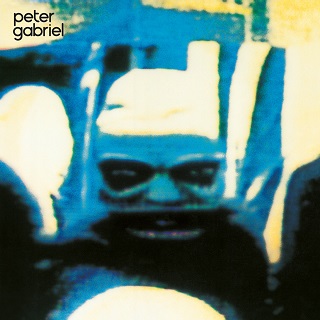
Peter Gabriel is the fourth studio album by the English rock musician Peter Gabriel. In the United States and Canada, the album was released by Geffen Records with the title Security. Some music streaming services refer to it as Peter Gabriel 4: Security. A German-language version, entitled Deutsches Album, was also released. The album saw Gabriel expanding on the post-punk and world music influences from his 1980 self-titled record, and earned him his first US top 40 single with "Shock the Monkey".
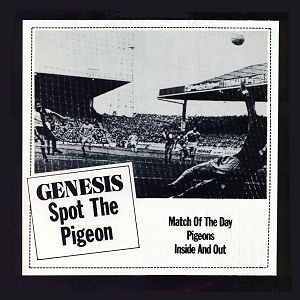
Spot the Pigeon is the first EP by English progressive rock band Genesis, released on 20 May 1977. Its three songs were originally written for the group's eighth studio album Wind & Wuthering (1976), but were not included in the final track selection. It was the final studio release to feature guitarist Steve Hackett prior to his departure from Genesis.
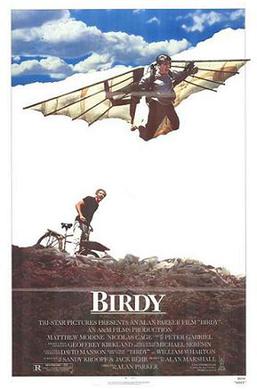
Birdy is a 1984 American drama film based on William Wharton's 1978 novel of the same name. Directed by Alan Parker, it stars Matthew Modine and Nicolas Cage. Set in 1960s Philadelphia, Pennsylvania, the film focuses on the friendship between two teenage boys, Birdy (Modine) and Al Columbato (Cage). The story is presented in flashbacks, with a frame narrative depicting their traumatic experiences upon serving in the Vietnam War.

"Shock the Monkey" is a song by the English rock musician Peter Gabriel. It was released in September 1982 as the first single from his fourth self-titled studio album, issued in the US under the title Security.

Peter Gabriel is the third solo studio album by the English rock musician Peter Gabriel, released on 30 May 1980 by Charisma Records. The album, produced by Steve Lillywhite, has been acclaimed as Gabriel's artistic breakthrough as a solo artist. AllMusic wrote that it established him as "one of rock's most ambitious, innovative musicians".

Shaking the Tree: Sixteen Golden Greats is a compilation album by the English rock musician Peter Gabriel. It was released in 1990 as Gabriel's first career retrospective, including songs from his first solo album Peter Gabriel (1977), through Passion: Music for The Last Temptation of Christ (1989). It was remastered with most of Gabriel's catalogue in 2002. The vinyl version of the album is called Shaking the Tree: Twelve Golden Greats.
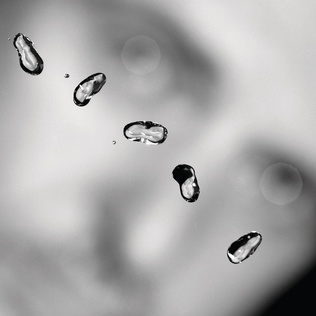
Up is the seventh studio and thirteenth album overall by the English rock musician Peter Gabriel, released on 23 September 2002 through Geffen and Real World Records. The album rose to number 9 in the US, number 11 in the UK, and captured the number 1 position in Italy. Most critics reviewed it positively, though Rolling Stone said Gabriel was "out of touch". This would be Gabriel's last studio album of new original material for 21 years until the release of I/O (2023), although he did release several studio projects in the interim.

"Supper's Ready" is a song by English progressive rock band Genesis, recorded for their 1972 studio album Foxtrot. At 23 minutes in length, it is the band's longest recorded song and almost takes up the entire second side of the vinyl. Frontman Peter Gabriel wrote the lyrics, which mainly describe a personal journey of scenes from the Book of Revelation and good versus evil, with several real life experiences providing further inspiration.

"Solsbury Hill" is the debut solo single by English rock musician Peter Gabriel. He wrote the song about a spiritual experience atop Solsbury Hill in Somerset, England, after his departure from the progressive rock band Genesis, of which he had been the lead vocalist since its inception. The single was a Top 20 hit in the UK, peaking at number 13, and reached number 68 on the Billboard Hot 100 chart in 1977.
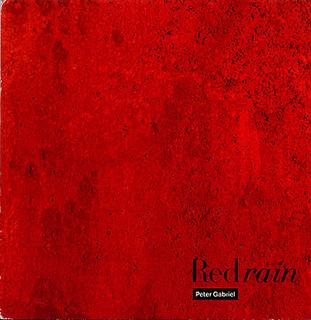
"Red Rain" is the first track on English rock musician Peter Gabriel's fifth solo studio album So (1986). In the United States, it was the second single from the album and reached number three on Billboard magazine's Mainstream Rock chart in 1986, where it stayed for three weeks between July and August. In the rest of the world it was not released until 1987 and received less airplay and fewer sales, peaking at 46 in the UK Singles Chart after entering the chart in July of that year. A live version also charted in the US and the UK in 1994.
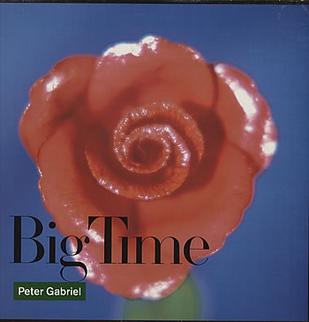
"Big Time" is a song by English rock musician Peter Gabriel from his fifth studio album So (1986). It was his second top-ten single on the Billboard Hot 100, peaking at no. 8.

Robbie Robertson is the solo debut album by Canadian rock musician Robbie Robertson, released in 1987. Though Robertson had been a professional musician since the late 1950s, notably a founder of and primary songwriter for The Band, this was his first solo album. Robbie Robertson won the Juno Award for "Album of the Year", and producers Daniel Lanois and Robertson won the "Producer of the Year" Juno award, both in 1989; there were no Juno Awards in 1988.
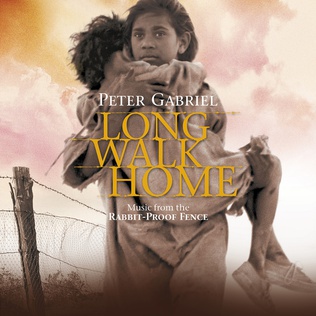
Long Walk Home: Music from the Rabbit-Proof Fence, released in June 2002, is the fourth soundtrack album and twelfth album overall by the English rock musician Peter Gabriel. Devised as the soundtrack to the Australian film Rabbit-Proof Fence, it was the first release of new music by Peter Gabriel since OVO, a commissioned work for the Millennium Dome Show in 2000. The soundtrack contains elements from and references to songs which Peter would release on his album Up. The track "A Sense of Home" samples the drum loops used on "No Way Out". "Running to the Rain", "Crossing the Salt Pan", and "The Return" are reworked arrangements of "Signal to Noise", track nine of Up. "Ngankarrparni" and "Cloudless" are reworked arrangements of track three, "Sky Blue".

Labyrinth is a soundtrack album by David Bowie and composer Trevor Jones, released in 1986 for the film Labyrinth. It was the second of three soundtrack releases in which Bowie had a major role, following Christiane F. (1981) and preceding The Buddha of Suburbia (1993). The soundtrack album features Jones' score, which is split into six tracks for the soundtrack: "Into the Labyrinth", "Sarah", "Hallucination", "The Goblin Battle", "Thirteen O'Clock", and "Home at Last".
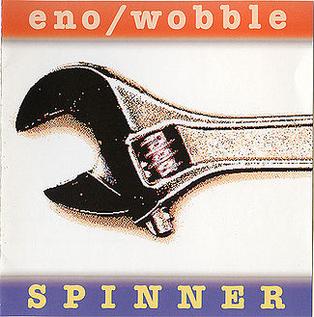
Spinner is an instrumental album by British musicians Brian Eno and Jah Wobble, released in 1995.

Sebastian Hardie were Australia's first symphonic rock band. They formed in Sydney in 1967 as Sebastian Hardie Blues Band but dropped the 'Blues Band' reference when they became pop-oriented. By 1973 they developed a more progressive rock style, and later performed as Windchase, but disbanded in 1977. An early member of Sebastian Hardie was Jon English, who starred as Judas Iscariot in the Australian version of the stage musical Jesus Christ Superstar in 1972, he subsequently had a solo career as a singer, actor and playwright. A later member, Mario Millo became a multi-award winner for his television and movie music.
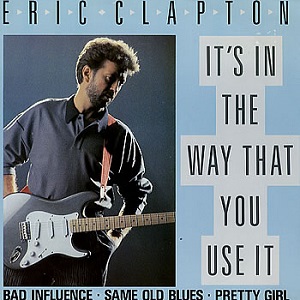
"It's in the Way That You Use It" is a song which was written by the English rock musician Eric Clapton in collaboration with The Band's guitarist and composer Robbie Robertson. The song was recorded and performed by Eric Clapton, who released the track under licence of Warner Bros. Records as the second of four singles from his 1986 studio album August in March 1987. The song, which is used as the theme tune to the Martin Scorsese film The Color of Money, was produced by Eric Clapton himself with the help of Tom Dowd, who acted as the assistant producer. The release sold more than 500,000 copies worldwide.




















